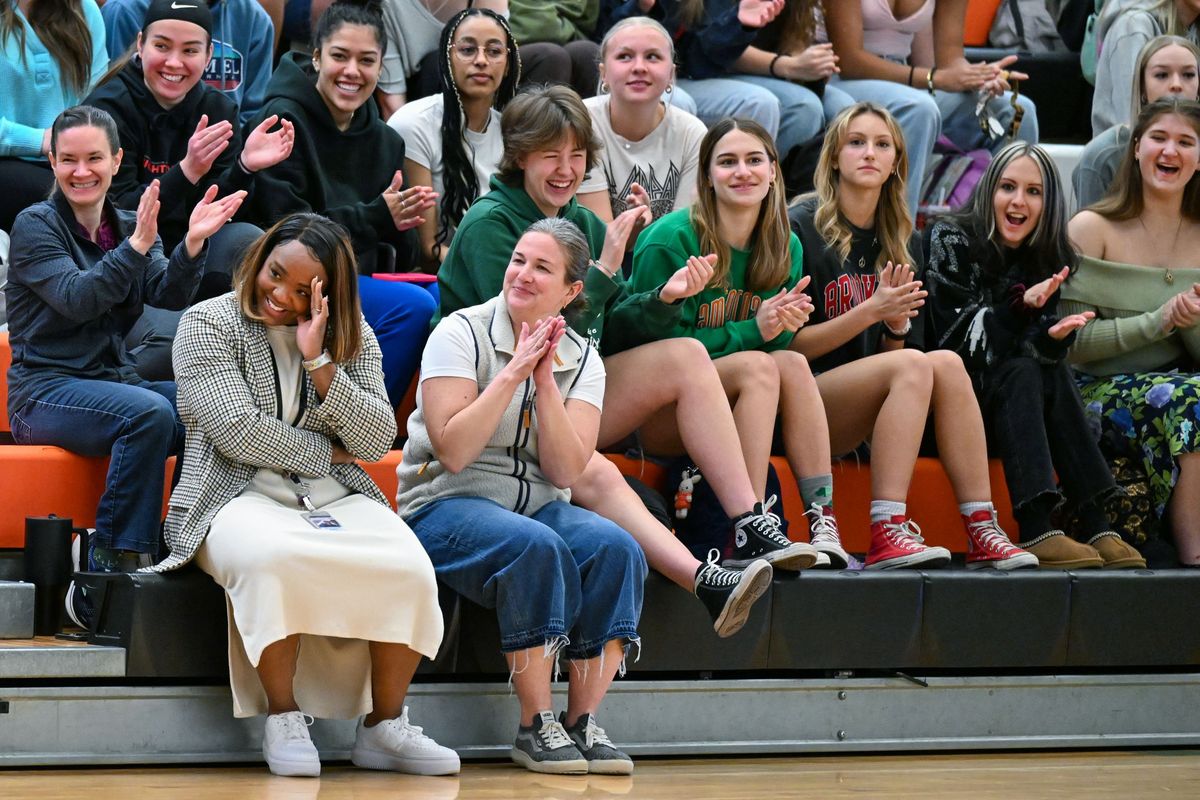West Valley High School teacher wins region’s adviser of the year award: ‘She holds us to a higher standard’

Shanté Payne, teacher and adviser at West Valley High School, won two awards Monday, not for what she does directly, but what she allows her students to do.
Students surprised her Monday with a whole-school assembly to recognize the award she earned for stepping back: high school adviser of the year from the Northeast region of the Association of Washington Student Leaders.
Rather than a hand-holding, helicopter style of teaching, students and colleagues said she knows when to observe from a distance and allow kids to learn by doing.
“She definitely treats us more as adults rather than students. She sees eye-to-eye to us, instead of looking down or telling us what to do, which I really appreciate,” said senior Abby Hogberg, one of the three anchors and producers behind Eagle News, a weekly video news segment Payne minimally oversees as Leadership adviser. “It really gives us an opportunity to leave an impact and leave the legacy that we want to leave behind.”
Eagle News is just one of the many projects she delegates to her leadership students, who arrange assemblies, plan spirit dress-up days and coordinate homecoming festivities, athletic competitions and other school-pride initiatives.
“They basically run this place,” Payne laughed.
Payne also teaches Geometry at West Valley and advises the National Honors Society club. She formerly taught special education math in New Mexico for two years before moving to the Millwood district eight years ago.
The trio behind Eagle News – Hogberg, senior Preston Engeland and junior Derek Maney – arranged the assembly as a surprise for Payne. She was aware of the award, but not the whole-school assembly in her honor disguised as a live taping of an Eagle News episode.
Superintendent Kyle Rydell also surprised her with a second accolade: the district’s “above and beyond” award.
Payne’s laissez-faire guidance empowers students, building confidence in their own abilities. It’s for loosening the reins that James Layman, director of the Association of Washington Student Leaders, selected Payne as the first winner of the regional award.
“It’s just important as you go through life to realize that whatever happens, things happen because of what you do,” Maney said. “Whether that be you make someone’s day or you do something wrong and you’ve learned from it, you know, just going through life building off of what you’ve done to become a better person.”
She encourages newscasters to include a diverse array of students in their broadcasts, for which they often roam the halls and pull students aside for quick interviews. Not just the “jocks” or “4.0 students,” she said.
“She just values perspectives and that there’s always different voices to be heard,” said Engeland, who nominated Payne for the recognition.
Inclusion, even of students who shy away from participation, is her north star.
“Even if they aren’t really involved, right, just to know that we see you, you don’t have to be involved, but we see you,” Payne said. “Guess what? If we asked you to do something, you know, we would love for you to do it and hold yourself to a standard that you can hold yourself to, because you should.”
It’s a mindset with which she begins and ends each day, greeting each student she passes in the halls and coming in before and after school to have candid and casual conversations with her pupils. Her consideration for less outgoing students follows her after the school year sunsets. Last year, she taught summer school at a juvenile detention center in Spokane and plans to return this summer.
“That’s ultimately the population of kids I like to and want to work with. I was in foster care growing up and just in and out of systems and stuff,” Payne said. “So it’s great working with really motivated students, but I am always on the other side of the spectrum.”
Throughout her 10-year career in education, Payne found a common thread weaving through her students in leadership, special education, geometry and in the detention center. Regardless of their background, she said, these kids just want to be known.
“Whether they’re really high-functioning leaders out in the public in the front of the line or they’re not, they (have) a bunch of trauma, back of the line, not coming to school, at the end of the day, you remove all those barriers, they’re all the same,” Payne said. “They all want to be recognized, whether they say they want to be loved or not, they all want to be loved, and they all want somebody to just care.”